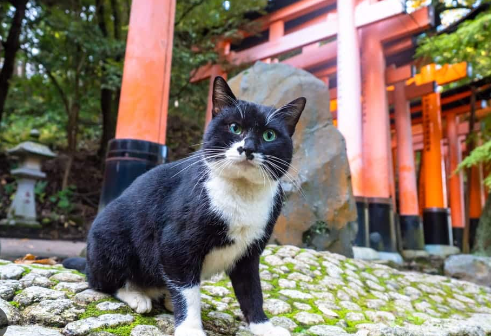Cats have captivated hearts across Asia for centuries, revered for their grace, independence, and mystical aura. Choosing a name for your feline companion is a momentous occasion, and delving into the rich tapestry of Asian cultures offers a treasure trove of unique and meaningful options. This comprehensive guide will embark on a captivating journey through the enchanting world of Asian cat names, exploring their historical significance, cultural influences, and the beautiful meanings they hold.

A Tapestry of Traditions: Unveiling the Roots of Asian Cat Names
Across the vast expanse of Asia, diverse cultures have developed their own unique ways of naming cats. Let’s delve into some of the most prominent regions and their naming traditions:
- China: In Chinese culture, cats are often seen as symbols of good luck and prosperity. Names frequently reflect these positive associations, with characters like “Xing” (meaning “lucky”) or “Fu” (meaning “happiness”) commonly used. Additionally, physical appearance plays a role, with names like “Xiao Hui” (meaning “little grey”) or “Ban Ban” (meaning “spotted”) being popular choices.
- Japan: Japanese cat names are known for their poetic beauty and connection to nature. Names like “Yuki” (meaning “snow”) or “Hana” (meaning “flower”) evoke a sense of serenity and elegance. Additionally, some names reference personality traits, with “Yoru” (meaning “night”) for a nocturnal cat or “Chikara” (meaning “strength”) for a particularly feisty feline.
- Korea: Similar to Japan, Korean cat names often draw inspiration from nature. Names like “Bada” (meaning “ocean”) or “Ddal” (meaning “moon”) showcase this connection. Additionally, Korean names can be playful and affectionate, with options like “Nabi” (meaning “butterfly”) or “Ddeokbokki” (a popular Korean rice cake dish) adding a touch of whimsy.
- Southeast Asia: In Southeast Asian countries like Thailand and Vietnam, cat names can be more straightforward. Owners might simply choose a word that describes the cat’s appearance, such as “Dam” (meaning “black”) in Thai or “Mun” (meaning “white”) in Vietnamese. However, some regions also incorporate lucky numbers or auspicious words into their cat names.
Popular Asian Cat Names by Region
| Region | Example Names | Meanings |
|---|---|---|
| China | Xingfu (兴福), Miao (喵), Mimi (咪咪) | Lucky, Cat, Little Cat |
| Japan | Yuki (雪), Hana (花), Sora (空) | Snow, Flower, Sky |
| Korea | Bada (바다), Ddal (달), Nara (나라) | Ocean, Moon, Country |
| Southeast Asia | Dam (ดำ), Mun (Mun), Mai (มะลิ) | Black (Thai), White (Vietnamese), Jasmine (Thai) |
A Celebration of Meaning: Unveiling the Stories Behind the Names
Beyond aesthetics, Asian cat names often hold deep cultural significance and personal meaning for their owners. Here are some examples:
- Mythology and Folklore: Many Asian cultures have rich mythologies filled with stories about cats. In Japan, the beckoning cat, “Maneki-neko,” is a symbol of good fortune. Naming your cat after this feline deity invites prosperity into your home.
- Buddhism and Hinduism: Both Buddhism and Hinduism hold cats in high regard. Names like “Buddha” or “Lakshmi” (the Hindu goddess of wealth) reflect these spiritual connections.
- Personality Traits: Asian cultures also use names to capture a cat’s unique personality. “Yuuki” (meaning “brave”) might suit a bold feline, while “Amaya” (meaning “night rain”) could be fitting for a more reserved cat.
- Food and Nature: Food and natural elements are popular sources of inspiration for Asian cat names. “Wasabi” (a spicy green paste) or “Sakura” (cherry blossom) add a touch of whimsy and cultural flair.
The Art of Choosing the Perfect Name: A Guide for Cat Parents
With a plethora of options available, selecting the ideal name for your Asian cat can feel overwhelming. Here are some helpful tips:
- Consider your cat’s personality: Observe your cat’s behavior and temperament. Are they playful, laid-back, or mischievous? Choosing a name that reflects their personality creates a special connection.
- Think about pronunciation: Opt for a name that’s easy for you and others to pronounce. Short, clear names are ideal for training purposes.
- Embrace cultural significance (continued): Choose a name that resonates with your heritage or cultural background. It can be a meaningful way to connect with your roots.
- Listen to your intuition: Ultimately, the best name is the one that feels right for you and your cat. Trust your gut feeling and go with the option that sparks the most joy.
The Power of Sound: Exploring the Onomatopoeic Charm of Asian Cat Names
Asian languages are known for their rich use of onomatopoeia, words that imitate sounds. This playful approach extends to cat names, adding a layer of charm and whimsy. Here are some examples:
- Japan: Names like “Nyan” (the sound of a cat’s meow) or “Goro” (the sound of a cat purring) are delightful examples of onomatopoeic cat names in Japanese.
- Korea: “Nyaong” (meow) and “Hong” (purr) are Korean equivalents, offering a cute and sound-inspired way to name your feline friend.
- China: “Miao” (meow) is a common onomatopoeic word used in Chinese cat names.
These sound-based names not only create a playful connection with your cat but also offer a unique cultural touch.
Beyond Borders: The Global Appeal of Asian Cat Names
The allure of Asian cat names transcends geographical boundaries. Their cultural richness, beautiful meanings, and often short and easy pronunciations have captured the hearts of cat lovers worldwide. Here’s why Asian cat names are becoming increasingly popular:
- Uniqueness: In a world filled with common cat names like “Whiskers” or “Mittens,” Asian names offer a way to stand out from the crowd.
- Cultural Connection: Choosing an Asian name allows you to connect with a vibrant and fascinating culture, even if you don’t have Asian heritage.
- Meaningful Associations: The rich meanings embedded in many Asian names add a deeper layer of connection between you and your feline companion.
Frequently Asked Questions (FAQs)
- Can I name my cat after a food item? Absolutely! “Wasabi” (Japan), “Durian” (Southeast Asia), or “Mochi” (Japan) are all fun and culturally-inspired food-related names.
- What if I don’t know how to pronounce the name? Many online resources offer pronunciation guides for Asian names. Additionally, don’t be afraid to ask someone familiar with the language for help.
- Is it okay to choose a name from a different Asian culture than my own? Absolutely! Appreciation for diverse cultures is encouraged. Just be mindful of the meaning and choose a name that resonates with you.
- Where can I find more inspiration for Asian cat names? There are many resources available online, including baby name websites with Asian name sections. Additionally, books on Asian culture or mythology can offer unique naming ideas.
Conclusion
The world of Asian cat names is a captivating tapestry woven with history, culture, and beautiful meanings. From the lucky symbols of China to the poetic nature references of Japan, these names offer a way to celebrate your feline companion and connect with a rich cultural heritage. So, delve into this enchanting world, explore the possibilities, and find the perfect name that reflects your unique bond with your Asian cat.
Additional Resources
- Behind the Name: A comprehensive website with name origins and meanings from various cultures, including many Asian names https://www.behindthename.com/info/.
- Japanese Names List: A website offering a vast list of Japanese names with pronunciations and meanings http://www.20000-names.com/female_japanese_names.htm.
- Korean Names List: Explore a wide variety of Korean names with pronunciations and meanings https://en.wikipedia.org/wiki/Category:Korean_feminine_given_names.
Remember, choosing a name for your cat is a special moment. Take your time, explore the rich tapestry of Asian names, and find the one that purrfectly suits your feline friend!






